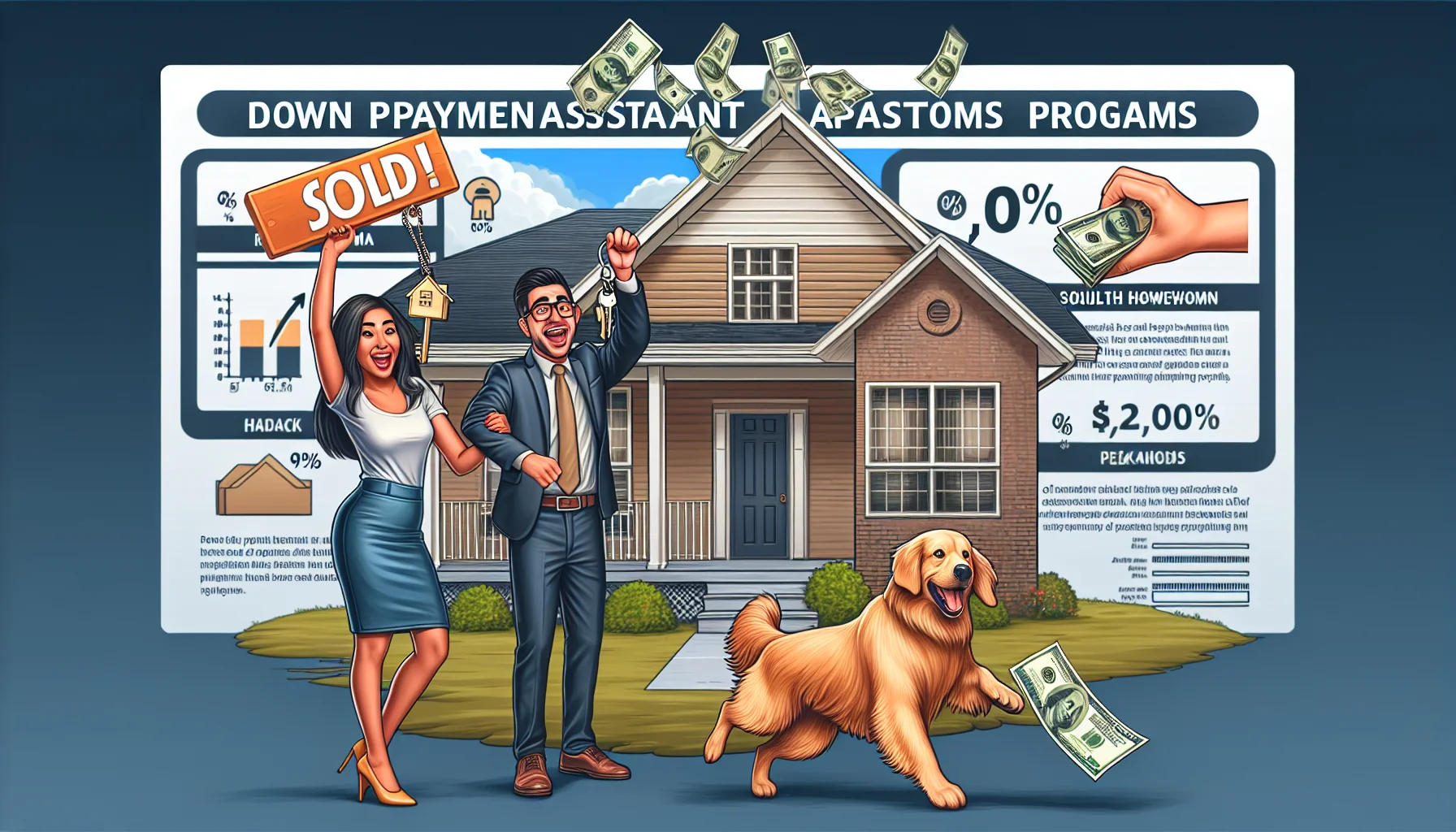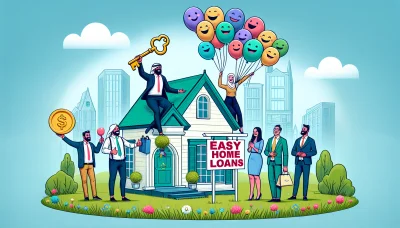Down payment assistance programs alabama Quiz
Test Your Knowledge
Question of
Understanding Down Payment Assistance in Alabama
Eligibility Criteria for Assistance Programs
Down payment assistance programs in Alabama are tailored to help individuals achieve the dream of homeownership. These programs often have specific eligibility requirements that applicants must meet. Understanding these criteria is crucial for potential homebuyers looking to benefit from such assistance.
Income Limits and Household Size: One of the primary factors considered in down payment assistance programs is the applicant's income relative to their household size. This ensures that the aid is directed towards those most in need, typically targeting low to moderate-income families.
First-Time Homebuyer Status: Many programs in Alabama are specifically designed for first-time homebuyers. This status typically means you haven't owned a home in the past three years. However, some exceptions may apply, like for veterans or buyers purchasing in certain areas.
Property Location and Type: Eligibility often depends on the location and type of property you intend to purchase. Some programs may only apply to homes in rural areas or designated neighborhoods, while others might restrict assistance to single-family residences or condos.
Types of Down Payment Assistance
The types of down payment assistance available can vary widely, each with its own benefits and stipulations. It's essential to explore all options to determine which form of assistance best aligns with your financial situation and homeownership goals.
Grants and Forgivable Loans: Grants are incredibly sought-after as they do not require repayment if certain conditions are met. Forgivable loans operate similarly, potentially converting into grants over a period of time contingent upon meeting program requirements.
- Deferred Payment Loans: These loans typically do not require monthly payments and only need to be repaid when you sell, refinance, or pay off your primary mortgage. They're an excellent option for buyers who need immediate assistance without the burden of additional monthly payments.
- Matched Savings Programs: These incentivize saving by matching your contributions towards a down payment, often at favorable rates. It's a way to multiply your savings efforts, making homeownership more attainable sooner than you might think.
How to Apply for Down Payment Assistance
Preparing Your Application
Before you even think about filling out your application, you need to get your ducks in a row. Start by gathering all the necessary paperwork. This typically includes tax returns, pay stubs, employment verification, and bank statements. Without these documents, lenders can't assess your financial situation.
Your credit score is like your financial fingerprint and lenders scrutinize it closely. Before applying, check your credit report for errors that could hurt your score. Aim to have a score that meets or exceeds the program's requirements. This can significantly boost your chances of qualifying for assistance.
Documentation Required
Assembling required documentation is crucial to the down payment assistance application process. You'll need proof of income, asset statements, and often evidence of homeowner education courses. Organize these documents early to avoid delays.
Credit Score Considerations
Credit scores play a pivotal role in securing down payment assistance. Higher scores generally lead to better terms and more options. If your score is lacking, consider postponing your application while you work on improving it.
Finding Participating Lenders
Not all lenders participate in down payment assistance programs. Research is key! Look for those experienced with first-time homebuyer programs as they'll be more adept at guiding you through the process.
The Application Process Step by Step
The journey begins with an initial inquiry where you'll learn about the types of assistance available and if you're eligible. It's also a time to ask questions and possibly undergo housing counselinga valuable educational resource that can prepare you for homeownership.
Initial Inquiry and Counseling
Contacting agencies offering down payment assistance should be your first step. They will inform you about available programs and eligibility criteria. Housing counseling may follow, providing insight into budgeting, borrowing, and the responsibilities of homeownership.
- Research: Investigate various programs' eligibility criteria and benefits.
- Counseling: Complete any required homeowner education or counseling sessions early on.
- Paperwork: Gather all necessary financial documentation before applying.
- Lender Search: Find a lender who is familiar with down payment assistance processes.
- Credit Check: Review your credit report for inaccuracies and improve your score if needed.
- Ask Questions: Don't hesitate to seek clarification on any aspect of the application process or program requirements.
- Timelines: Be mindful of deadlines for applications to ensure you don't miss out due to a technicality.
Completing and Submitting the Application
Filling out the application carefully is paramount; mistakes can cause delays or even rejections. Ensure all information is accurate and complete before submission. Double-check everything!
What Happens After Applying
After submitting your application, there will be a period of waiting while it's reviewed. Use this time wisely: continue saving money, avoid making large purchases that could affect your credit, and stay in touch with your lender or counselor for updates.
Exploring State-Sponsored Programs in Alabama
Alabama Housing Finance Authority (AHFA) Programs
The Alabama Housing Finance Authority is a powerhouse of resources for residents seeking affordable housing solutions. With an array of programs, AHFA stands as a beacon of hope for low to moderate-income families, ensuring the dream of homeownership becomes a tangible reality for Alabamians.
Through strategic partnerships and innovative funding mechanisms, AHFA has carved a pathway to financial stability for countless individuals. Their commitment to community development and sustainable housing initiatives is not only commendable but vital for the state's economic growth.
Step Up Program Features
The Step Up program is a revolutionary initiative designed to bridge the gap between potential homeowners and their aspirations. By offering down payment assistance alongside competitive 30-year fixed-rate mortgages, Step Up empowers individuals who might otherwise be excluded from the housing market.
The program is tailored to cater to both first-time and repeat buyers, effectively expanding its reach. It ensures that purchasing a home is not just a fleeting dream but an achievable goal for hardworking Alabamians.
Mortgage Credit Certificates (MCC)
A Mortgage Credit Certificate is nothing short of a financial game-changer for eligible homebuyers. This certificate allows recipients to claim a tax credit, reducing their federal income tax liability and, in turn, increasing their net earnings.
MCCs are powerful tools in the hands of savvy consumers, enabling them to leverage tax benefits to secure better mortgage terms. This is not just assistance; it's a strategic investment in the people of Alabama.
Affordable Income Subsidy Grant (AIS)
The Affordable Income Subsidy Grant is a targeted effort aimed at low-income earners. The AIS provides additional financial support on top of existing mortgage arrangements, reducing monthly payments and easing the financial burden on homeowners.
This grant exemplifies AHFA's commitment to inclusivity in homeownership opportunities. It ensures that economic barriers do not hinder deserving families from securing their own homes.
Local Community Programs
Local community programs in Alabama are pivotal complements to state-sponsored housing initiatives. These programs are often more specialized, addressing unique local needs and fostering community spirit through collaboration and direct impact.
By tapping into these resources, residents can take advantage of tailored assistance that aligns with specific regional challenges and opportunities. This localized approach not only strengthens communities but also enriches the state's overall housing landscape.
HOME Investment Partnerships Program
The HOME Investment Partnerships Program operates as a catalyst for public-private collaboration in the realm of affordable housing development. The program injects much-needed funds into building, buying, and rehabilitating affordable homes for rent or ownership.
- Funding Allocation: Funds are distributed based on need, ensuring areas with significant challenges receive adequate support.
- Local Tailoring: Projects can be customized to address specific community requirements, making each initiative relevant and impactful.
- Community Involvement: Stakeholder engagement is encouraged throughout project lifecycles, promoting transparency and buy-in from local populations.
- Leveraging Resources: Partnerships with private entities maximize resource utilization and foster innovative solutions within communities.
- Sustainability Focus: Sustainable design and construction practices are emphasized to ensure long-term viability and environmental stewardship.
Community Development Block Grants (CDBG)
CDBGs represent an adaptable funding source that empowers communities to tackle a diverse array of development challenges head-on. These grants support projects ranging from infrastructure improvements to economic development initiatives that directly benefit low- and moderate-income individuals.
Neighborhood Stabilization Program (NSP)
The Neighborhood Stabilization Program is specifically engineered to breathe new life into areas hit hardest by foreclosures and property abandonment. By repurposing distressed properties, NSP fosters revitalization efforts that stabilize neighborhoods and provide quality housing options.
Benefits of Down Payment Assistance for Homebuyers
Financial Advantages
Down payment assistance programs are a game-changer for many aspiring homeowners. They bridge the initial financial gap, making the dream of owning a home a tangible reality. With these programs in place, the daunting hurdle of saving for a substantial down payment is significantly lowered.
Lowering Initial Out-of-Pocket Costs is one of the most immediate benefits. These programs can cover a portion or even all of the down payment, meaning buyers can reserve their savings for other expenses or emergencies. This advantage cannot be overstatedit's life-altering!
Furthermore, by Reducing Mortgage Payments , down payment assistance directly affects monthly affordability. A lower loan amount translates to smaller mortgage payments, easing the financial burden and increasing disposable income.
Last but not least, down payment assistance helps in Building Home Equity Sooner . A larger down payment means owning a greater piece of your property right from the start. This equity is a powerful financial tool and serves as a stepping stone for future investment opportunities.
Long-Term Homeownership Success
The ripple effects of down payment assistance extend far beyond the initial purchase. Homeowners often experience a sense of Stability and Security Benefits . Owning a home provides a fixed housing cost, protecting against rent increases and contributing to peace of mind and community ties.
In terms of personal finances, there's an undeniable Impact on Personal Wealth Growth . Each mortgage payment builds equity, acting like a forced savings plan. Over time, this can result in significant wealth accumulationa key aspect of long-term financial planning.
- Maintain Good Credit: A strong credit score can qualify you for better assistance programs.
- Explore Options: Research local and federal assistance programs to find the best fit.
- Understand Terms: Know the conditions tied to the assistance, such as residency requirements or repayment rules.
- Budget Wisely: Even with assistance, ensure your overall budget aligns with your long-term financial goals.
- Seek Professional Advice: Consult with real estate professionals who specialize in down payment assistance.
Beyond individual gains, there are substantial Community and Economic Advantages . Homeownership rates correlate with stronger neighborhoods and increased civic participation. Furthermore, it stimulates the economy through home-related purchases and services. Its cleardown payment assistance has far-reaching impacts that benefit everyone involved!
Navigating the Real Estate Market with Assistance Funds
Finding Properties Eligible for Assistance
Embarking on the journey to homeownership can be exhilarating when you have assistance funds at your disposal. It's crucial to identify properties that qualify for such programs, as not all homes are eligible. Start by researching local and federal assistance options and their property requirements.
When you're in the market for a home, consider exploring targeted areas earmarked for revitalization. These regions often offer additional incentives to encourage community development and homeownership. Its a win-win situation: you could secure financial benefits while contributing to the area's renewal.
Targeted Areas for Revitalization
Focusing on targeted areas can lead to more than just financial perks; it can also mean becoming part of a growing community. Check with housing agencies for lists of these areas. Often, they come with larger assistance amounts or more lenient eligibility criteria.
New Construction vs. Existing Homes
The choice between new construction and existing homes is pivotal. New constructions may have higher initial costs but could offer modern features and warranties. Existing homes might be more budget-friendly upfront but can entail hidden maintenance costs.
Working with Real Estate Agents Knowledgeable in DPA Programs
Partner with real estate agents who have a firm grasp of Down Payment Assistance (DPA) programs. They can be invaluable in guiding you through the process, ensuring that you maximize the benefits available to you. Their expertise can simplify the path to finding your dream home within the parameters of assistance funds.
The Role of Down Payment in Mortgage Approval
The down payment is a cornerstone of mortgage approval, serving as a demonstration of your investment in the property. A larger down payment often results in more favorable loan terms and can be a decisive factor in obtaining mortgage approval.
Loan-to-Value Ratio Considerations
Lenders assess risk through the loan-to-value ratio (LTV). A lower LTV, achieved by a higher down payment, signifies reduced risk and can lead to better interest rates and broader loan options. Assistance funds can help bolster your down payment, improving your LTV ratio.
Mortgage Insurance Implications
Mortgage insurance might become mandatory if your down payment is below a certain threshold, typically 20%. This additional cost can affect your monthly payments and overall loan affordability. Utilizing assistance funds effectively reduces this burden.
- Negotiate Effectively: A substantial down payment enhances your bargaining position with sellers, potentially leading to concessions or price reductions.
- Long-Term Savings: Over time, a larger down payment means less interest paid and lower total borrowing costs.
- Emergency Buffer: By not depleting your savings for the down payment thanks to assistance funds, you maintain an emergency buffer crucial for any homeowner.
- Mortgage Qualification: A solid down payment increases your chances of mortgage qualification, opening doors to various lenders and loan products.
Negotiating power with sellers is yet another aspect influenced by the size of your down payment. With more skin in the game, sellers may view you as a more serious buyer which could lead to beneficial negotiating terms and conditions during the purchase process.
Overcoming Common Challenges with Down Payment Assistance
Addressing Loan Repayment Concerns
One of the biggest hurdles potential homeowners face is understanding the repayment terms of down payment assistance (DPA) loans. It's crucial to comprehend the conditions under which repayment is triggered, which typically include selling the home, refinancing, or finishing the mortgage term. By grasping these terms upfront, you can plan your financial future with confidence.
Another concern arises when borrowers anticipate difficulties in repaying their DPA loan. It's imperative to communicate with lenders early on to explore options. Some programs offer flexibility in repayment plans, making it easier for homeowners to manage their finances without undue stress.
Understanding Recapture Terms
Recapture tax is a concept that often accompanies DPA loans, and it's vital to understand how it works. This tax can come into play when you sell your home at a profit under certain DPA programs. Familiarizing yourself with recapture terms helps avoid surprises during the sale of your property.
To mitigate the impact of recapture tax, consider long-term homeownership. The longer you stay in your home, the less likely you are to be affected by recapture provisions. Always consult with a tax advisor to understand how these terms apply to your specific situation.
Strategies for Avoiding Penalties
Avoiding penalties associated with DPA loans is all about strategic planning and adhering to program guidelines. Ensure that you thoroughly read through the loan agreement and understand any actions that might trigger penalties. This knowledge empowers you to make informed decisions about your home and finances.
- Maintain Occupancy: Most DPA programs require the property to be your primary residence; failing to comply could result in penalties.
- Timely Communication: Notify lenders immediately if your circumstances change, as they may offer solutions or alternatives.
- Financial Planning: Develop a robust financial plan that accounts for potential changes in income or expenses over time.
- Familiarize Yourself with Terms: Revisit your loan agreement periodically to stay aware of any actions that could incur penalties.
Refinancing Options with DPA Loans
If interest rates drop or your financial situation improves, refinancing could be an attractive option even with a DPA loan. However, it's essential to verify whether your DPA program permits refinancing without triggering repayment obligations. In some cases, refinancing can lead to more favorable terms and contribute significantly to long-term savings.
Contacting your lender for guidance on refinancing options tailored for DPA loans can yield valuable insights. They can provide clarity on how refinancing might affect your assistance benefits and help you navigate the decision-making process effectively.
Staying Informed on Program Changes and Updates
The landscape of down payment assistance programs is constantly evolving due to economic shifts and policy changes. Staying abreast of these changes ensures you can maximize the benefits available to you and avoid any pitfalls resulting from outdated information.
Keeping Track of Funding Availability
DPA programs often operate on limited funding, which can run out quickly. Prospective homeowners should monitor funding levels regularly so as not to miss out on available assistance. Engaging actively with local housing authorities or nonprofit organizations gives you an edge in securing funds before they deplete.
Legislative Changes Affecting DPA Programs
Legislation at both state and federal levels can have profound impacts on DPA programs. Keeping an eye on legislative developments helps prepare for any adjustments needed in your strategy for obtaining or maintaining down payment assistance. Proactive awareness of legal changes prevents being caught off guard by new requirements or benefits alterations.
Staying Connected with Housing Counselors and Advisors
Housing counselors and financial advisors are indispensable allies in navigating the complexities of down payment assistance programs. These professionals provide personalized advice based on current program stipulations and individual financial circumstances. Regular consultations help maintain a clear path towards successful homeownership without unexpected complications arising from DPA challenges.












